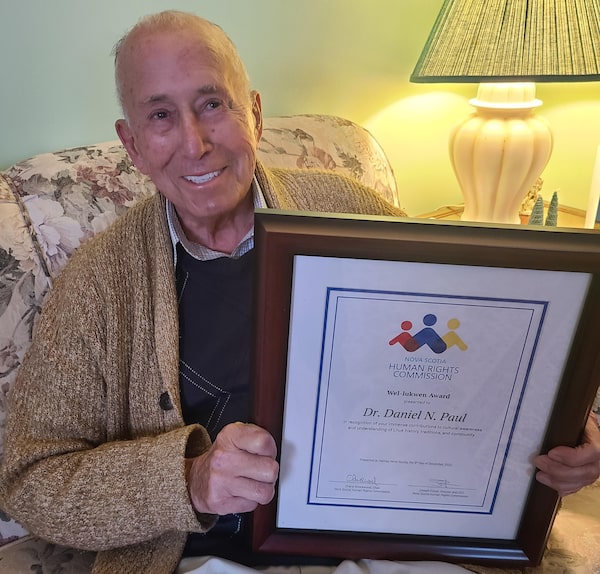
Daniel Paul holds his Nova Scotia Human Rights award for furthering Indigenous issues.HO/The Canadian Press
Mi’kmaq elder Daniel Paul, who collected the often painful details of his people’s history, died Tuesday at the age of 84.
The multiple editions of Mr. Paul’s book, We Were Not the Savages, revealed how Canadian history had glossed over the brutal tactics of colonial governments and failed to diagnose the true causes of the sharp decline in the Mi’kmaq population.
His research also helped persuade Nova Scotia politicians that statues, school names and even a Coast Guard ship should no longer bear the name of Edward Cornwallis, the province’s first governor, who offered rewards for Indigenous scalps.
Candice Lee Sylliboy said her uncle died in Halifax. She described him as an intelligent, loving and wise man. “He sure left a footprint for all of us to follow for years to come,” she wrote on her Facebook page.
Errol Sharpe, co-owner of Fernwood Publishing, which published the last three editions of We Were Not the Savages, said in an interview Wednesday the book has had an enduring influence on Nova Scotia society.
“I think the impact has been the ongoing and increased awareness of Indigenous people ... and what was stolen from them,” he said. “Take myself, for example. Forty years ago, when this book first came out, I had no awareness of most of this history.”
Mr. Paul updated each edition of his book, and the final one confronted critics who had argued that scalping was common in 18th-century warfare. In response, he published evidence that Cornwallis’s tactics were a deliberate attack on unarmed Mi’kmaq civilians.
Mr. Paul’s writing also urged a reconsideration of the simplistic narrative about the decline of the Mi’kmaq population, which reached a low of 1,300 in 1843, as being mainly due to low immunity to European-originated diseases.
In the fourth edition, he offered what he called “a more plausible theory,” that the destruction of traditional food resources caused famine, malnutrition and starvation, which severely lowered resistance to all diseases.
Even as he battled cancer in the final year of his life, Mr. Paul continued to probe how incivility against Indigenous Peoples lingered into 20th-century Canadian politics.
In the latest book, he laid out the well-documented abuse at the Shubenacadie residential school and honed in on the whipping of boys with a “seven-thronged strap” in 1934, sanctioned by school director Reverend Jeremiah Mackey.
He quoted from work by York University political scientist Karen Bridget Murray, who in 2015 documented how then-prime minister R.B. Bennett appointed Louis Arthur Audette to head a commission of inquiry into the flogging at the Shubenacadie school, despite Audette’s record of racism. Audette’s finding – that there was no harm in punishment by “infliction of physical pain” – was accepted by Bennett. The process, wrote Mr. Paul, was “a farce.”
In an interview in December with The Canadian Press, Mr. Paul said his research began when he was a senior civil servant with the former Department of Indian Affairs and Northern Development from 1971 to 1985, during which time he studied the Indian Act, peace treaties and archival materials.
At times, he used his knowledge of the workings of Canadian government to assist his people.
He recalled Chief Raymond Francis, the former leader of Pictou Landing First Nation, coming to his office in 1981 to seek advice on how to get compensation from the province and a pulp company for allowing a mill to deposit industrial effluent in the Boat Harbour lagoon.
Mr. Paul said he advised the chief to shift the focus of the lawsuit to the federal government for dereliction of its duties. Years later, the final settlement for the band was about $35-million.